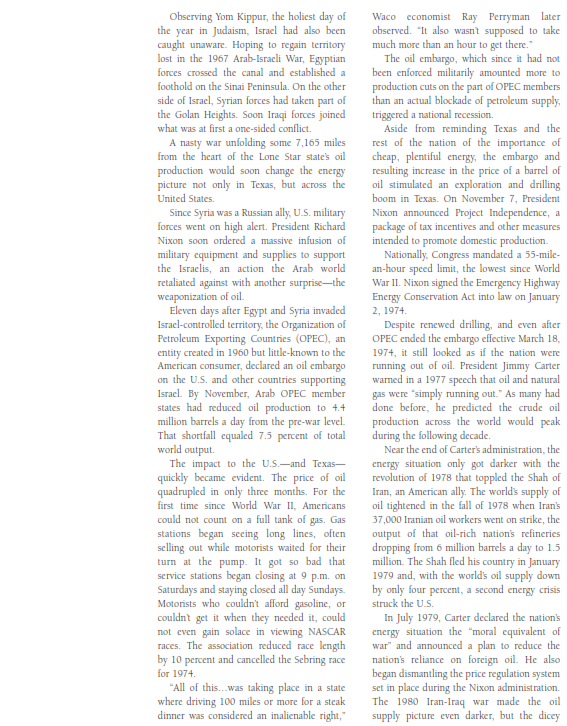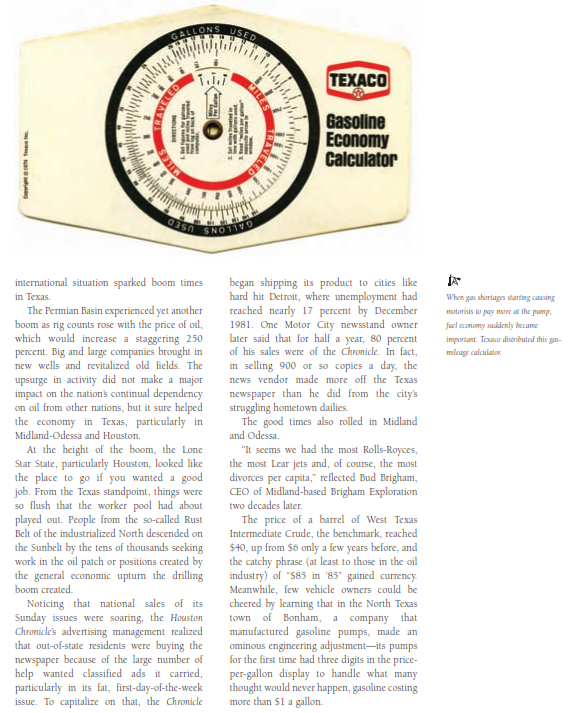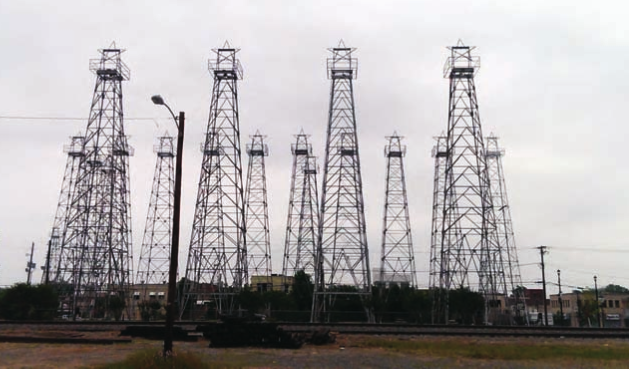CHAPTER 9
END OF AN ERA
In 1970, American produced 9.6 million barrels of oil a day. That was as good as it would get. The next year, production across the nation dropped slightly and the trend continued. Oil production in Texas peaked in 1972 at 3.4 million barrels a day.
Dr. Hubbert's prediction, made 15 years before, had come to pass.
Even at the highest level of production, Texas and the other states with significant proven oil reserves had not been producing enough crude to keep up with consumption. In fact, not since the administration of President Truman had U.S. domestic production met U.S. demand. Every year since 1948, reliance on foreign oil had been growing-a far cry from World War II, when the U.S. produced 63 percent of the world's oil.
In 1973, the term "energy crisis" entered the American vernacular. What since Spindletop had seemed like an always-available, always-inexpensive supply of oil and gas suddenly could no longer be taken for granted. Neither could brand names in a highly competitive market. On January 1, Humble Oil and Refining Co. became Exxon USA. Two months to the day later, 100- year-old Curt Hammil died in Houston. He had been the last living key figure in the drilling of the Spindletop well.
Natural gas availability arose as the first energy-related problem of the decade. In the winter of 1972-73, shortages of natural gas became critical. At one point, Dallas found itself on the brink of having no available natural gas. San Antonio and Austin, among other cities, saw shortages that led to energy rationing. The University of Texas had to cancel some classes because it did not have sufficient natural gas to heat some of its buildings. Gov. Dolph Briscoe ordered energy use reductions for state office buildings and even cut lighting on state highways.
Oil or coal-fired power plants began to look like the future of electrical generation in Texas, at least until an even more reliable, if controversial, means became available. Austin and San Antonio voted to participate in the South Texas Nuclear Project, an effort that would eventually bring on- line the state's second nuclear power plant. (The first would be Comanche Peak in Somervell County, which went online in 1990.)
And then, in the early fall, things got worse.
On a cool October morning in 1973, staffers of the two afternoon newspapers serving the two largest cities in the Permian Basin, the Odessa American and its next-door competitor, the Midland Reporter-Telegram, had barely had time to get their first cup of coffee down before the alarm bells on the 66-words-a-minute Associated Press printers in their respective news rooms began an incessant ringing. The A-wire from AP headquarters in New York was moving a bulletin conveying sketchy, but stunning news - war had broken out in the oil-rich Middle East.
At 2 p.m. on October 6, 1973-6 a.m. in Midland-Odessa-Egyptian artillery had begun shelling Israeli positions along the Suez Canal while that Arab nation's Soviet-supplied aircraft rained down rockets and bombs on Israeli Defense Force personnel and tanks. By the end of the day, following a massive, Blitzkrieg-like operation, five Egyptian infantry divisions occupied the Israeli side.
The attack caught the U.S. intelligence community by surprise, not to mention the average American, already more preoccupied with college football and the seemingly ever-deepening Watergate scandal than foreign affairs. While satellite imagery had revealed a massive buildup of Arab military forces in the days leading up to the attack, the Central Intelligence Agency misinterpreted the data. The nation's best and brightest cloak-and-dagger types wrongly concluded that Egypt and Syria had only been engaging in routine military maneuvers. Not until shortly before the balloon went up did the U.S. realize war was imminent. By then, despite urgent telephone calls from Secretary of State Henry Kissinger to his counterparts with Egypt and Syria, it was too late.









